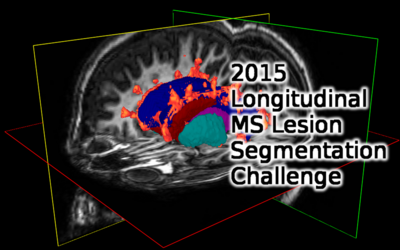MSChallenge
<meta name="title" content="The 2015 Longitudinal Multiple Sclerosis Lesion Segmentation Challenge" />
The 2015 Longitudinal MS Lesion Segmentation Challenge
| 2015 Longitudinal MS Lesion Segmentation Challenge | ||
|---|---|---|
| MS Challenge Overview | MS Challenge Data | MS Challenge Evaluation |
I. Introduction
The Longitudinal MS Lesion Segmentation Challenge was conducted at the 2015 International Symposium on Biomedical Imaging in New York, NY, April 16-19. Competing teams applied their automatic lesion segmentation algorithms to MR neuroimaging data acquired at multiple time points from MS patients. Algorithms were evaluated against manual segmentations from two raters in terms of their segmentation accuracy and ability to track lesion evolution.
34 Teams initially registered for the Challenge coming from 15 different countries, representing 27 different institutions/universities. Congratulations to Team IIT Madras (First Prize), Team PVG_1 (Second Prize), and Team IMI (Third Prize and Efficiency Prize)!
Information about the data is available here, and the evaluation software from here.
Current Leaderboard
A live leaderboard is maintained on the Smart Stats Website. This leaderboard is updated to include links to the associated papers; most currently point to the main Challenge Article: A. Carass, S. Roy, A. Jog, J.L. Cuzzocreo, E. Magrath, A. Gherman, J. Button, J. Nguyen, F. Prados, C.H. Sudre, M.J. Cardoso, N. Cawley, O. Ciccarelli, C.A.M. Wheeler-Kingshott, S. Ourselin, L. Catanese, H. Deshpande, P. Maurel, O. Commowick, C. Barillot, X. Tomas-Fernandez, S.K. Warfield, S. Vaidya, A. Chunduru, R. Muthuganapathy, G. Krishnamurthi, A. Jesson, T. Arbel, O. Maier, H. Handels, L.O. Iheme, D. Unay, S. Jain, D.M. Sima, D. Smeets, M. Ghafoorian, B. Platel, A. Birenbaum, H. Greenspan, P.-L. Bazin, P.A. Calabresi, C.M. Crainiceanu, L.M. Ellingsen, D.S. Reich, J.L. Prince, and D.L. Pham, "Longitudinal Multiple Sclerosis Lesion Segmentation: Resource and Challenge", NeuroImage, 148(C):77-102, 2017. ![]() (PubMed).
(PubMed).
| Leaderboard | |||
| Ranking | Method Name Authors Paper Title Paper Link(s) |
Website Score | |
| 1 | MV-CNN A. Birenbaum & H. Greenspan Multi-View Convolutional Neural Networks |
91.267 | |
| 2 | MIAC S. Andermatt, J. Würfel, & P.C. Cattin |
91.011 | |
| 3 | Team PVG One A. Jesson & T. Arbel Hierarchical MRF and Random Forest Segmentation of MS Lesions and Healthy Tissues in Brain MRI |
90.698 | |
| 4 | Team IMI O. Maier & H. Handels MS-Lesion Segmentation in MRI with Random Forests |
90.283 | |
| 5 | ATMS O. Ghribi |
90.170 | |
| 6 | MV-CNN A. Birenbaum & H. Greenspan Multi-View Convolutional Neural Networks |
90.070 | |
| 7 | Team VISAGES GCEM L. Catanese, O. Commowick, & C. Barillot Automatic Graph Cut Segmentation of Multiple Sclerosis Lesions |
89.807 | |
| 8 | Team IIT Madras S. Vaidya, A. Chunduru, R. Muthuganapathy, & G. Krishnamurthi Longitudinal Multiple Sclerosis Lesion Segmentation using 3D Convolutional Neural Networks |
89.159 | |
| 9 | Team MS*metrix* S. Jain, D.M. Sima, & D. Smeets Automatic Longitudinal Multiple Sclerosis Lesion Segmentation |
88.744 | |
| 10 | Lesion-TOADS N. Shiee, P.-L. Bazin, A. Ozturk, D. S. Reich, P. A. Calabresi, & D. L. Pham A topology-preserving approach to the segmentation of brain images with multiple sclerosis lesions |
88.465 | |
| 11 | Team CMIC F. Prados, M.J. Cardoso, N. Cawley, O. Ciccarelli, C.A.M. Wheeler-Kingshott, & S. Ourselin Multi-Contrast PatchMatch Algorithm for Multiple Sclerosis Lesion Detection |
88.009 | |
| 12 | MORF A. Jog, A. Carass, D.L. Pham, & J.L. Prince Multi-Output Random Forests for Lesion Segmentation in Multiple Sclerosis |
87.917 | |
| 13 | Team TIG-BF C.H. Sudre, M.J. Cardoso, & S. Ourselin Model Selection Propagation for Application on Longitudinal MS Lesion Segmentation |
87.376 | |
| 14 | Team CRL X. Tomas-Fernandez & S.K. Warfield Model of Population and Subject (MOPS) Segmentation |
87.017 | |
| 15 | Team DIAG M. Ghafoorian & B. Platel Convolution Neural Networks for MS Lesion Segmentation |
86.916 | |
| 16 | Team TIG C.H. Sudre, M.J. Cardoso, & S. Ourselin Model Selection Propagation for Application on Longitudinal MS Lesion Segmentation |
86.436 | |
| 17 | Team VISAGES DL H. Deshpande, P. Maurel, & C. Barillot Sparse Representations and Dictionary Learning Based Longitudinal Segmentation of Multiple Sclerosis Lesions |
86.068 | |
| 18 | Team BAUMIP L.O. Iheme & D. Unay Automatic White Matter Hyperintensity Segmentation using FLAIR MRI |
84.140 | |
VII. Organizers
Primary Organizer:
Dzung Pham, Center for Neuroscience and Regenerative Medicine, Henry M. Jackson Foundation for the Advancement of Military Medicine, Bethesda, MD
Organizing committee members:
Pierre-Louis Bazin, Department of Neurophysics, Max Planck Institute, Leipzig, Germany
Aaron Carass, Department of Electrical and Computer Engineering, Johns Hopkins University, Baltimore, MD
Peter Calabresi, Department of Neurology, Johns Hopkins University, Baltimore, MD
Ciprian Crainiceanu, Department of Biostatistics, Johns Hopkins University, Baltimore, MD
Lotta Ellingsen, Department of Electrical and Computer Engineering, University of Iceland, Reykjavik, Iceland
Qing He, Center for Neuroscience and Regenerative Medicine, Henry Jackson Foundation, Bethesda, MD
Jerry Prince, Department of Electrical and Computer Engineering, Johns Hopkins University, Baltimore, MD
Daniel Reich, Translational Neuroradiology Unit, National Institute of Neurological Disorders and Stroke, National Institutes of Health, Bethesda, MD
Snehashis Roy, Center for Neuroscience and Regenerative Medicine, Henry Jackson Foundation, Bethesda, MD
VIII. Funding support
This challenge was supported in part by a grant from the National Institute of Neurological Disorders and Stroke (NINDS R01 NS070906). Funding for prizes was provided by the National Multiple Sclerosis Society.


